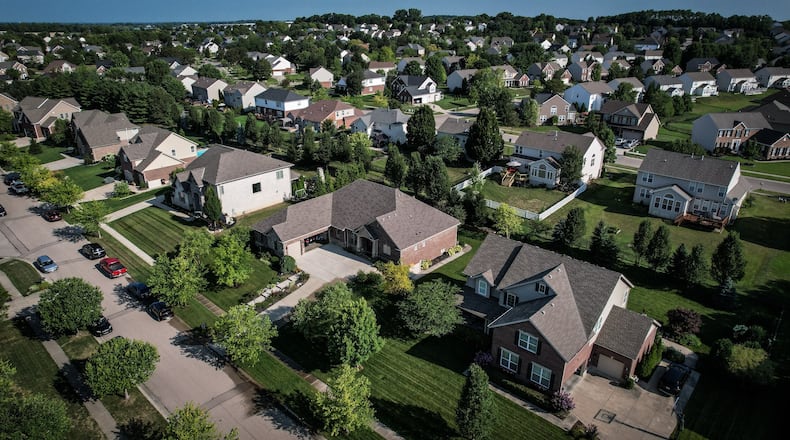Rep. David Thomas, the former Ashtabula County auditor who has been picked by Republican leadership to spearhead property tax reform, said the tax system is “broken.”
“The counties are able to have a sales tax, our cities and our villages and our schools are able to have an income tax and our question back is ultimately, if you have other ways to provide services, why place it all of the property owner, who for the last five years has been crying out that enough is enough and they’re tapped out,” Thomas said.
He said the $3.5 billion will save “the average Ohioan” $850 on their property tax bill, “if they own a home with the average value.”
All local entities get property taxes, cities and schools can collect income tax — townships can collect income tax but only within Joint Economic Development Districts — counties impose sales taxes, none get all three.
Property taxes fund schools and all forms of local government that provide services like police, fire and EMS, and social services.
Property tax reform has become a priority statewide after property values exploded post-pandemic. As a result many taxpayers took a big hit last year following the 2023 triennial update when property values soared by an average 37% in Butler County, 34% in Montgomery County and 30% in Greene County. Warren County underwent the sexennial reappraisal last year, and the average increase is 27%. Some county auditors are warning more increases in the 25% range are likely coming.
Thomas said they have been telling the locals they need to diversify their revenues and cut spending for the past six months but “that has not happened.” He told this media outlet he knows there’ll be blowback from the locals but they needed to act.
“We’ve got to do something big and bold and we’ve got to go it now,” he said.
“This is a fundamental change in how we do our property tax system, it is the biggest transformational proposal in 50 years.”
Credit: Andrew Welsh-Huggins
Credit: Andrew Welsh-Huggins
Rep. Bill Roemer, R-Richfield, who chairs the House Ways and Means Committee, said it is unfair to claim the state has done nothing to help taxpayers. He also noted the state is currently paying roughly $2 billion reimbursing local entities for the Homestead exemption, the 10% rollback.
“I cannot over stress the Ohio House of Representatives is very, very serious about property tax reform,” he said. “Right now we have 19 bills in Ways and Means dealing with property taxes in some manner and that doesn’t count the budget.”
This news outlet asked Thomas whether they had taken into account there are many areas of the state that do not have strong income or sales tax bases to support this new burden.
“The taxpayers don’t have the ability to come up with continued unvoted increases that we have seen over the last five years,” he said. “My constant response has been those entities are raising money through these unvoted means with spikes in values and that’s what’s led to the breaking of the system. That’s why we need to diversify, get out of just relying on the property tax bucket to fund our services.”
Property tax reform has been elusive for the past couple years so recently the Committee to Eliminate Property Taxes, a citizens group based in Cuyahoga County, has begun gathering petition signatures, trying to place a constitutional amendment on the November ballot eliminating property taxes.
Butler County Commissioner Don Dixon said he predicted it, “I said people have had enough and they’re going to fix it and they’re going to get the pitchforks out, you know what the pitchforks are out and they’re coming.”
Butler County officials were the first to sound the alarm bell two years ago when the values exploded. They say their pleas for a temporary fix — employ a three-year average which would have lowered the value spikes considerably — while the legislature hammered out a permanent fix, fell of deaf ears.
Dixon said the lawmakers in Columbus are now faced with a threat and “they’re just trying to make sense out of a bunch of spaghetti.”
There are several other components to this effort, now named House Bill 335, including three measures already in the vetting process by the House Ways and Means Committee. House Bill 129 would modify the 20-mill floor calculation and save roughly $107 million next year. House Bill 186 limits increases in property tax revenues for school districts at the 20-mill floor to the three-year average rate of inflation, an estimated $41.9 million taxpayer boost. House Bill 309 gives local budget commissions more power to lower bloated budgets.
The new proposal also allows counties to increase sales taxes an additional 1%, with voter approval. County commissioners are also given permission to give Homestead exemption recipients a “piggyback” benefit with their own funds.
The Senate introduced its budget on Tuesday and the 20-mill floor calculation adjustment and budget commission provision are both included along with a number of other reforms. The senators took the House’s budget provision limiting carryover for school districts at 30% and raised the threshold to 50%.
Legislators created a Joint Committee on Property Tax Review and Reform in the previous state budget. It resulted in 21 recommendations for various ways the general assembly “should” act to address the problem but no favored fixes.
Credit: AP
Credit: AP
The legislature introduced 23 property tax relief bills over the previous two-year General Assembly and only passed two, namely indexing the homestead exemption to inflation — which was done in the previous budget — and a small measure applying to surviving spouses of disabled veterans that may apply to only a couple hundred taxpayers statewide.
House Speaker Matt Huffman, R-Lima told this media outlet recently “I think we need to do something dramatic and impactful” because the measure “has legs” and if it doesn’t pass this year they can try again in 2026.
About the Author


